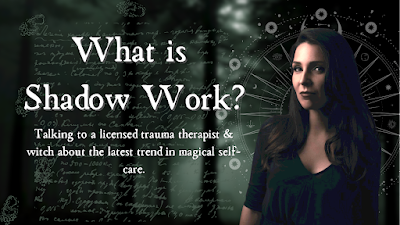Episode 178: Inciting A Shadow Work Riot
Shadow Work is a trend that seems to have come out of nowhere in the last two years. One cannot explore much of witchy social media these days without seeing recommendations to “do your shadow work”, which seems to mean anything from “go to therapy” to “meditate more” to “write your feelings in a journal”. As with many trends, plenty of people are trying to commodify it with spiritual advisors selling shadow work services alongside tarot and astrology readings, sometimes inserting it into a reading without prior notice. Spiritual dabblers are buying up Shadow Work journals and seeking out more information about how to do this work themselves or with a professional. But…what is it and what makes a professional Shadow Work…er?
Shadow Work is a term stemming from Jungian psychology and is a part of trauma therapy, a sensitive practice where licensed trauma counselors assist patients with processing serious traumatic events in their lives. It is delicate, difficult work that takes years of training to master. Because of the nature of this form of therapy, there are a number of risks involved with undertaking it, and even more risks when determining what kind of professional should assist you.
I spoke to Lauren Theresa, a licensed Trauma Therapist and witch, to unpack how this term got wrapped up in modern spiritual discourse, what it really means, whether the online community’s version of shadow work matches up with reality, and what warning signs to look out for when beginning shadow work.
Find more of Lauren Theresa at LaurenTheresa.com.
Shadow Work Resources and Tips from Lauren Theresa
If Shadow Work is calling you, always use your intuition and check in with yourself first. Make a mental (or written) inventory of the darkest place you might go, the lowest points you’ve been. When diving into your shadows, you have to be prepared to navigate those depths. It is an incredible process and looks different to everyone, but as with everything deep and important, it’s not without its risks.
If Shadow Work is calling you, always use your intuition and check in with yourself first. Make a mental (or written) inventory of the darkest place you might go, the lowest points you’ve been. When diving into your shadows, you have to be prepared to navigate those depths. It is an incredible process and looks different to everyone, but as with everything deep and important, it’s not without its risks.
Securing a Therapist
Ideally, everyone would have a licensed, trauma informed, mental health practitioner available to walk with them through this process or at least be on call for if/when the waters get choppy. I always recommend looking into a trauma informed therapist. Some key words include trauma therapist, Jungian, depth-oriented, EMDR, somatic therapist, art therapist, etc. These words tip off that the individual has experience in not only symptom management or crisis situations, but also in navigating the deeper stuff.
When you can’t find a good fit in-network or sliding scale
When possible, go through insurance or someone with a sliding scale option. If you’ve been unable to find a good fit through insurance, contact your insurance carrier and ask then about a “single case agreement.” This is an arrangement between your therapist and insurance carrier, because by law insurance has to provide reasonable and appropriate coverage. For example if you’ve had a formal PTSD diagnosis in the past but can’t find anyone clearly “trauma informed” or with “EMDR” training within a reasonable distance, insurance has to cover someone who is. It’s not an easy process but I have seen it play out.
Keep going, but have a safety net
If accessing a trauma therapist doesn’t seem like a necessary or viable option, it’s still good to have some resources on hand. Within the US, there are free community mental health centers as well as “mental health helplines.” In addition, having a list of individuals or other community members who can be a support to you is key. Knowing who to call if you need it will only help the process and assist you in going deeper. Think of it as a safety net.
Diving in
As we talk about in the podcast, our defenses get a bad rap but they are truly amazing. Our conscious mind knows our limits and we will often only go as deep as we are capable of managing. Those are vital and important protective responses. I wholly support diving into your own work. If that online journal resonates with you, look into it (though honestly a blank one works just as well.) There are some additional books that can help when diving into the imaginal realms and setting the stage. Some good starting points are:
- Inner Work, Robert Johnson
- A Little Book on the Human Shadow, Robert Bly
- and literally everything by Marion Woodman
And remember, be very wary of practitioners outside the field of mental health that claim to facilitate shadow work. You’re tasking this individual with peeling back your well built defenses and bringing the deepest, darkest parts of yourself to the fore. That is not something to take lightly.
Support the Show
If you like this show and want to support it, there are a number of ways to help. Consider liking and sharing it on social media. You can also rate the show 5-stars on Apple Podcasts and leave a review. Help keep the show free and producing on a regular basis by chipping in whatever you can. You can buy me a Ko-fi (a one time donation of your choosing) https://ko-fi.com/incitingariot or join my Patreon on a monthly basis. Patrons receive additional audio and video content as well as archived episodes, a private Discord server, and monthly chats with special guests! Sign up at Patreon.com/IncitingARiot.Pre-order my book, The Dabbler’s Guide to Witchcraft, here: https://bit.ly/DabblersGuide
Love and Lyte,
Fire Lyte
IncitingARiot.com
FireLyte@incitingariot.com
Social Media & Podcast Subscription links: beacons.ai/incitingariot



Comments
Post a Comment